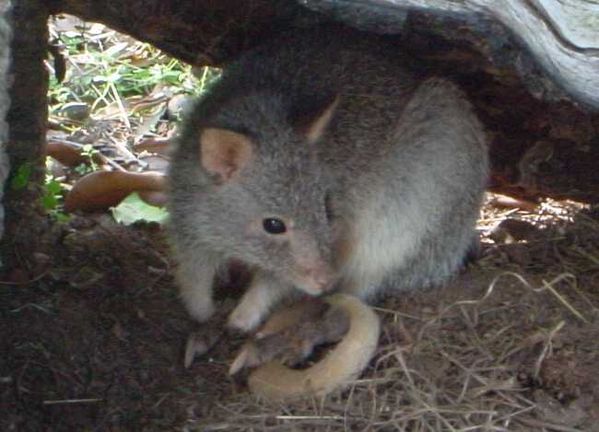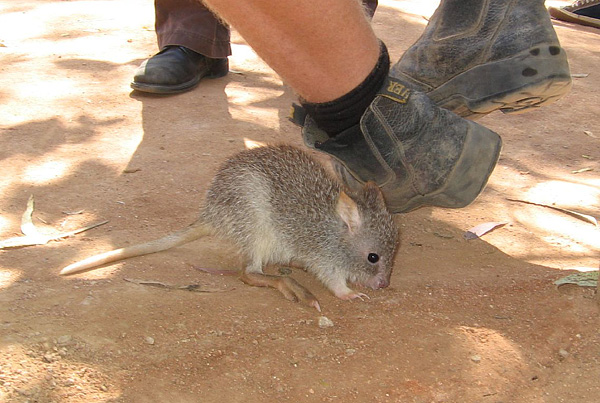|

Rufous Bettong at Australia Zoo
Photograph copyright: Kevin Hosking - all rights reserved. Used with permission.
|

Rufous Bettong photographed at Billabong Sanctuary, Townsville.
Image by robstephaustralia - Some rights reserved. (view image details)
|
|
|
RUFOUS BETTONG FACTS |
Description
The Rufous Bettong is a small marsupial (rat-kangaroo) with silvery grey and ginger fur, with a lighter coloured almost hairless tail. They have pointed ears, a hairy muzzle, pale red fur round the eyes. These bettongs are nocturnal and spend most of the night browsing on grasses and other plant food.
Other Names
Rufous rat-kangaroo
Size
Head and body length is about 38 cm, with tail about 36cm.
Habitat
Lives in open forest with dense grassy cover. It builds a nest of grass under thick tussock.
Food
Grass, roots, flowers, seeds and fungi
Breeding
The Rufous Bettong breeds throughout the year the female will give birth to a single young where it attaches itself to one of her four teats. Pouch life lasts for about 4 weeks. The young one stays close to the mother until about nine months of age.
Range
Eastern Australia from tropical Queensland down to central New South Wales.

Credits:
Map is from Atlas of Living Australia website at https://biocache.ala.org.au licensed under Creative Commons Attribution 3.0 License.
Notes
The Rufous Bettong, like all rat-kangaroo species is a very specialised plant-eater. The rat-kangaroos dig up and eat underground storage-organs of plants: tubers, bulbs, corms, and swollen roots, and especially truffles, which are the spore-bearing bodies of underground fungi. Those fungi (called ectomycorhizal fungi) associate with the rootlets of trees such as eucalypts, helping the tree to take up minerals from the soil. By digging up and eating the truffles, bettongs disperse those spores in their dung, helping the fungi to spread to new hosts. In that way bettongs play an important role in the ecosystems they live in. Restoring bettongs to areas from which they have disappeared may benefit the health of the whole ecosystem. Note from Yaraandoo Eco-Lodge web site www.yaraandoo.com.au.
Classification
| Class: | Mammalia | | Order: | Diprotodontia | | Family: | Potoroidae | | Genus: | Aepyprymnus | | Species: | rufescens | | Common Name: | Rufous bettong |
|
|

